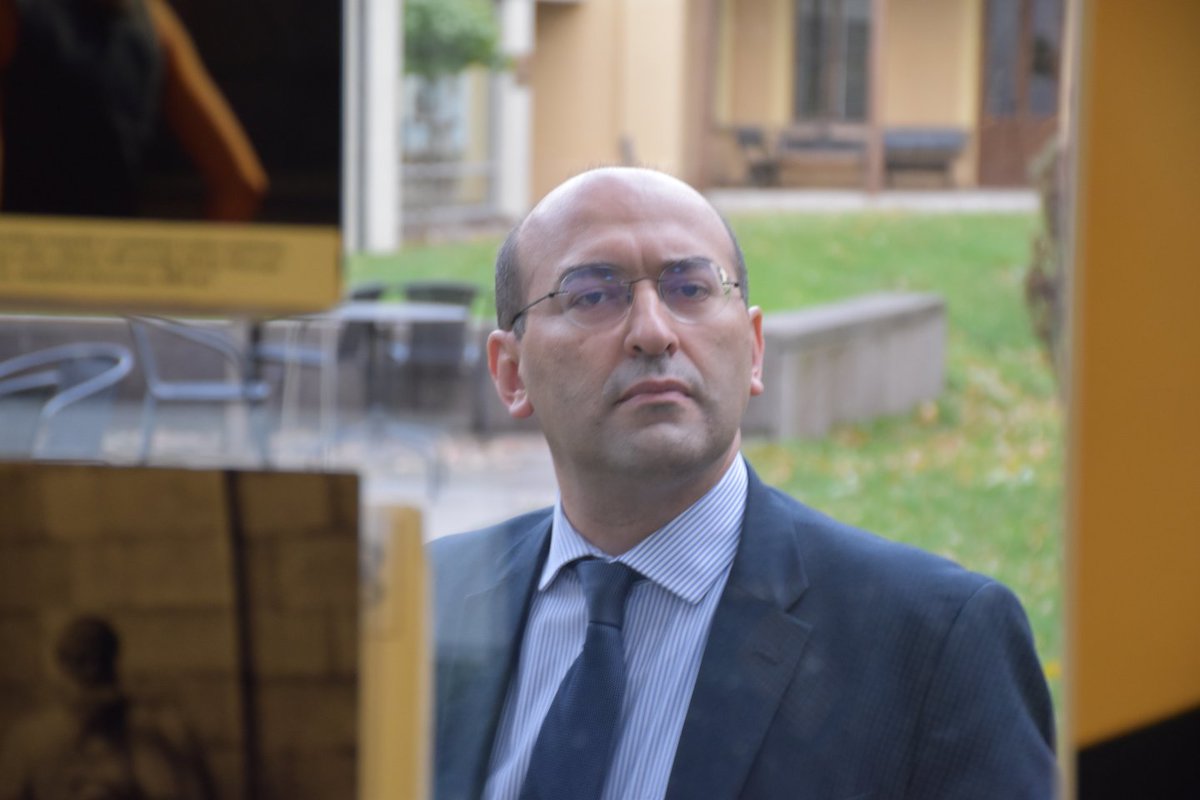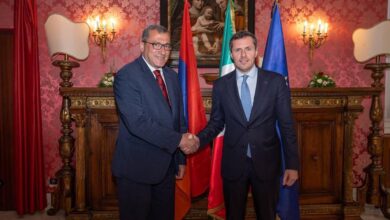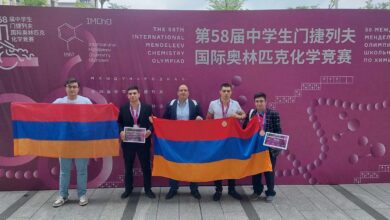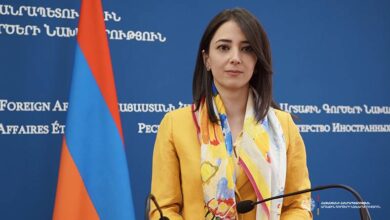
Armenia and Armenians worldwide will not allow another genocide, Tigran Mkrtchyan, Armenia’s Ambassador to Lithuania, Latvia and Estonia, said in an article published by Delfi.
“Blaming the victim for the crime is a well-known practice, particularly common to aggressors and oppressors, and is often used around the world. There were Nazis during the Holocaust who did everything they could to blame the Jews themselves for the terrible genocide. Holocaust deniers often use the same tactics. The tactics of blaming the victims were widely used by the young Turks in planning and carrying out the Armenian genocide. Even today, even at this very moment, the tactics of blaming the victims are being used!” the Ambassador wrote in an article on the recent clashes along the Armenian-Azerbaijani border.
Amb. Mkrtchyan reminded that on July 12, Azerbaijan launched aggressive actions against the territory of sovereign Armenia in the Tavush region, 150 km from Nagorno-Karabakh, in an effort to strengthen its military position. Several settlements in the Tavush region of Armenia, including Movses, Avgepar, Chinari and Nerkin Karmiragbjur became targets of the artillery fire and drone attacks of the Azerbaijani armed forces. Civilian infrastructures and residential buildings were damaged in the shelling.
He pointed to the fact that Azerbaijan had stationed artillery and armored vehicles in courtyards and between residential buildings in the village of Agdam, opposite the village of Chinari in Armenia.
“In the run-up to the attack on Armenian settlements, such positions were apparently chosen in order to claim that Armenia’s counter-attack was on civilian infrastructure in Azerbaijan,” the Ambassador further elaborated.
“The Armenian armed forces acted as any country’s army would in a similar situation: its main task was to protect the sovereign territory of its homeland. And this task was successfully accomplished, proving once again that money is not always and everywhere the decisive factor,” he added.
The Ambassador stressed that “in Baku’s view, provocations are a “testament to patriotism,” while blaming the victims has long been a key feature of the country’s ‘Armenian narrative’.”
He noted that demonstrations against Armenians were organized in different cities around the world, including Riga, in clear violation of local law. The aggressive behavior has provoked clashes between Azerbaijani and Armenian communities in Moscow, Brussels, Warsaw, London, several US states and elsewhere, and has led to desecration and deliberate destruction of Armenian diaspora property.
“Three decades of Azerbaijan’s dehumanizing Armenians and Armenia within its borders have resulted in irrational hatred, which is now being exported abroad and is raising eyebrows everywhere. The July 14 pro-war rally in Baku, with its chants of “death to Armenians,” were sadly reminiscent of the Sumgait 1988 and Baku 1990 brutal pogroms of Armenians. When the English thinker Thomas Hobbes articulated his theory, that mankind is in a state of “war of all against all,” he was describing human life as it existed before civil society,” Amb. Mkrtchyan wrote.
“When the German political theorist Carl Schmitt claimed that “the willingness to kill others for the simple reason that they are members of a hostile group” is the “ultimate degree of dissociation” in politics, he knew firsthand what he was talking about. He had lived through World War I. If we want to search for the roots of the Nagorno-Karabakh conflict, we must emphasize that this region has never been a part of the Republic of Azerbaijan. It was not within Azerbaijan when the latter declared its independence in 1991. Nagorno-Karabakh was not a part of Azerbaijan when it was first created in 1918,” he continued.
Tigran Mkrtchayn then briefed readers on some misleading these raised and used by Azerbaijan.
“Representatives of that country repeating ad nauseam that it was Armenia that “launched the attacks” in order to “jeopardize the normal functioning of energy and transport arteries such as the Baku-Tbilisi-Kars railway, the Baku-Tbilisi-Ceyhan oil pipeline”, etc., that Armenia is “threatening Europe’s energy independence.” I know that those who read such statements do not need to be informed of the revolution in military affairs (RMA), that is, of the changes in the nature of warfare due to the innovative use of new technologies. Nor do they need to be reminded that in today’s world, modern armies do not need to physically see the goal in order to destroy it. Armenia, the Republic of Nagorno-Karabakh and Azerbaijan have every opportunity to attack important infrastructure in the neighboring country. None of these countries needs to invade a neighboring country or use ground forces to destroy one target or another,” Amb. Mkrtchyan noted.
Instead, he says, we need to focus much more on the difference between opportunities and goals. “Armenia’s main goal is to ensure our national sovereignty, our borders, the security of our country and our people, and to promote global security. Armenian officials do not think and certainly do not talk about attacks on civilian infrastructure on the territory of Azerbaijan. But more recently, the whole world was shocked to learn that Azerbaijan’s Ministry of Defense has not officially ruled out the possibility of a rocket attack on the Mecamor nuclear power plant in Armenia. This unprecedented statement is a clear indication of the intention to commit genocide and of state-organized nuclear terrorism.”
“The Azerbaijani president says the Armenian leadership wants the conflict to “divert attention from internal problems.” In my opinion, we should not forget that one of the most important differences between Armenia and Azerbaijan is that Armenia is a democracy, while Azerbaijan is becoming more and more authoritarian. During the Azerbaijani aggression, the Armenian opposition supported the Armenian army, which was defending our country. In Azerbaijan, on the other hand, clashes between demonstrators and the police were used as a pretext to silence “domestic enemies,” Mr. Mkrtchyan continued.
In this regard he pointed to The Washington Post conclusion that “Mr Aliyev is using his iron fist to deal with critics in direct opposition to democracy, and that is why everyone would be wise to be seriously concerned about such an unbridled tyrant.”
The Ambassador presented the steps that need to be taken to ease the tension and achieve effective short-term results.
First, he stressed the importance of a credible international monitoring mechanism for violations of the ceasefire, which Yerevan and Stepanakert have welcomed, while Azerbaijan continues to violate the ceasefire agreement and blame the other side for the attack.
Second, the Ambassador reminded about the UN Secretary-General’s call for a “global ceasefire,” which Armenia has welcomed and expressed support to, while Azerbaijan is silent on the issue.
“Third, the Co-Chairs of the OSCE Minsk Group have called and continue to call on the parties to refrain from militant rhetoric. Unfortunately, we are still witnessing further escalation of Armenophobia and uncontrolled hate speech in Azerbaijan. It must be stopped immediately! Azerbaijani officials must publicly condemn the use of force (or the threat of use of force). The Azerbaijani leadership must acknowledge that peace talks are the only option,” he continued.
Fourth, he said “the whole international community needs to unwaveringly support the de-escalation of the situation, urge all sides to refrain from any action that might further escalate the situation. “In this regard, Azerbaijan’s senior ally Turkey has been anything but constructive. An unprecedented level of threats against Armenia have been part of the Turkish reaction. Evidences of this are the joint Turkish-Azerbaijani military drills running from July 29 to August 5, which include mortars, armed vehicles, and cannons striking simulated targets, as well as helicopters and warplanes in Baku, Nakhijevan, Ganja, Kurdamir, and Yevlakh (i.e. on the western and eastern borders of Armenia and not far from Nagorno-Karabakh).”
“Clearly, these are not exercises of a defensive nature. The expanded geography of aggression against Armenia has been Azerbaijani strategy from day one of the conflict of Nagorno-Karabakh, when in addition to the war against Artsakh, Azerbaijan attacked Armenian borders from all its borders and imposed blockade together with Turkey, which continues to this very day,” the Ambassador stressed.
Ne noted that “the language of threat must be stopped. “Armenia and Armenians around the world will not allow another genocide!” Amb. Mkrtchyan concluded.








